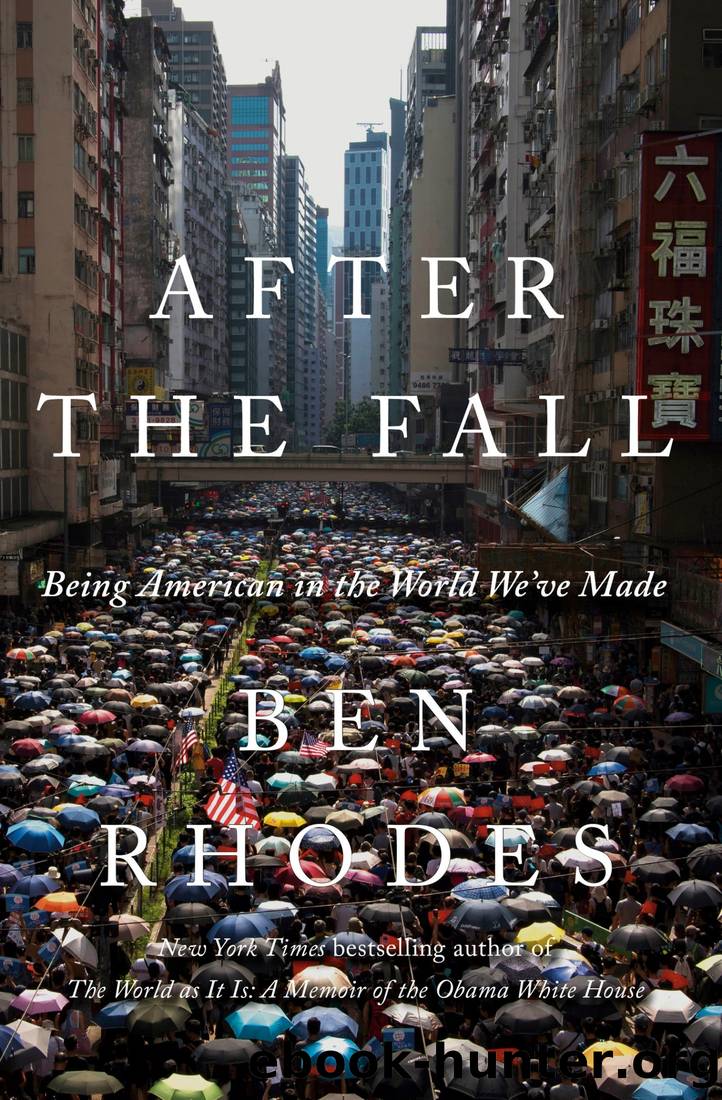After the Fall by Ben Rhodes

Author:Ben Rhodes [Rhodes, Ben]
Language: eng
Format: epub
Published: 2021-06-02T00:00:00+00:00
It was hard to imagine that these were really the most pressing concerns of the young people in the audience. Most Chinese would never hear the words Obama said about democracy, but they would see the pictures of a charismatic American president and smiling Chinese students, heirs of the brave new world. In a way, the same thing has happened to countless American brands whose allure has been repackaged for a Chinese audience, stripped of any trace of democracy. Huntsman jumped in with a question that had been submitted to the embassy: âIn a country with three hundred fifty million Internet users and sixty million bloggers, do you know of the firewall? And second, should we be able to use Twitter freely?â Obama responded with a long answer about the importance of a free and open Internet, access to the latest technologies, and freedom of speech and thought in general. The audience sat passively.
The so-called Great Firewall referred to in the question was Chinaâs nascent effort to build the first distinct national Internet. At first undesirable foreign websites were bannedâTwitter, Facebook, YouTube. Thousands of search terms were off-limits, things that were too dangerous for people to learn aboutâlike the Tiananmen protests. The Internet didnât provide all of human knowledge to all human beings after all; it was selective, like any human endeavor.
The firewall was the Chinese governmentâs response to one of the only remaining vulnerabilities for the Party. In the early 2000s, young Chinese lived within a strange duality: People consumed the latest popular culture from around the world while being taught to distrust the individual liberty that enabled the creativity that produced comic-book worlds, Beyoncé, and the NBA. The younger Chinese I talked to remembered an emerging discourse through the 2000s about political issues, particularly on tens of millions of microblogs, a version of the opening that Bao Pu had experienced in classrooms in the 1980s. There were debates about corruption and mismanagement, particularly at the local level, and growing activism around a more equitable rule of law. By the time we went to Shanghai, the Party had decided that this trend was unacceptable. They also had no interest in listening to Americans lecture them about their internal affairs, particularly as Americans were asking for Chinaâs help in getting out of the financial crisis of their own making.
By 2011, it had become fashionable to think that social media was the virus that would prove untreatable by authoritarian regimes. In the Arab Spring, mass mobilization fueled by social media toppled dictators across the Middle Eastâin Tunisia, Egypt, Libya, and Yemen. But the Communist Party saw that social media wasnât simply a threat. It could be controlled with the right firewall, and it was also a nearly ideal tool for surveillance and disinformation. Within Chinaâs Golden Shield program, the Party monitored Internet activity within China and blocked more sensitive keywords from Internet users. Emerging Chinese tech companies were made to understand that their own growth depended upon strict regulation of political content.
Download
This site does not store any files on its server. We only index and link to content provided by other sites. Please contact the content providers to delete copyright contents if any and email us, we'll remove relevant links or contents immediately.
| Africa | Americas |
| Arctic & Antarctica | Asia |
| Australia & Oceania | Europe |
| Middle East | Russia |
| United States | World |
| Ancient Civilizations | Military |
| Historical Study & Educational Resources |
The Dawn of Everything by David Graeber & David Wengrow(1682)
The Bomber Mafia by Malcolm Gladwell(1608)
Facing the Mountain by Daniel James Brown(1538)
Submerged Prehistory by Benjamin Jonathan; & Clive Bonsall & Catriona Pickard & Anders Fischer(1443)
Wandering in Strange Lands by Morgan Jerkins(1402)
Tip Top by Bill James(1398)
Driving While Brown: Sheriff Joe Arpaio Versus the Latino Resistance by Terry Greene Sterling & Jude Joffe-Block(1357)
Red Roulette : An Insider's Story of Wealth, Power, Corruption, and Vengeance in Today's China (9781982156176) by Shum Desmond(1341)
Evil Geniuses: The Unmaking of America: A Recent History by Kurt Andersen(1337)
The Way of Fire and Ice: The Living Tradition of Norse Paganism by Ryan Smith(1322)
American Kompromat by Craig Unger(1297)
It Was All a Lie by Stuart Stevens;(1290)
F*cking History by The Captain(1283)
American Dreams by Unknown(1271)
Treasure Islands: Tax Havens and the Men who Stole the World by Nicholas Shaxson(1247)
Evil Geniuses by Kurt Andersen(1243)
White House Inc. by Dan Alexander(1199)
The First Conspiracy by Brad Meltzer & Josh Mensch(1163)
The Fifteen Biggest Lies about the Economy: And Everything Else the Right Doesn't Want You to Know about Taxes, Jobs, and Corporate America by Joshua Holland(1109)
